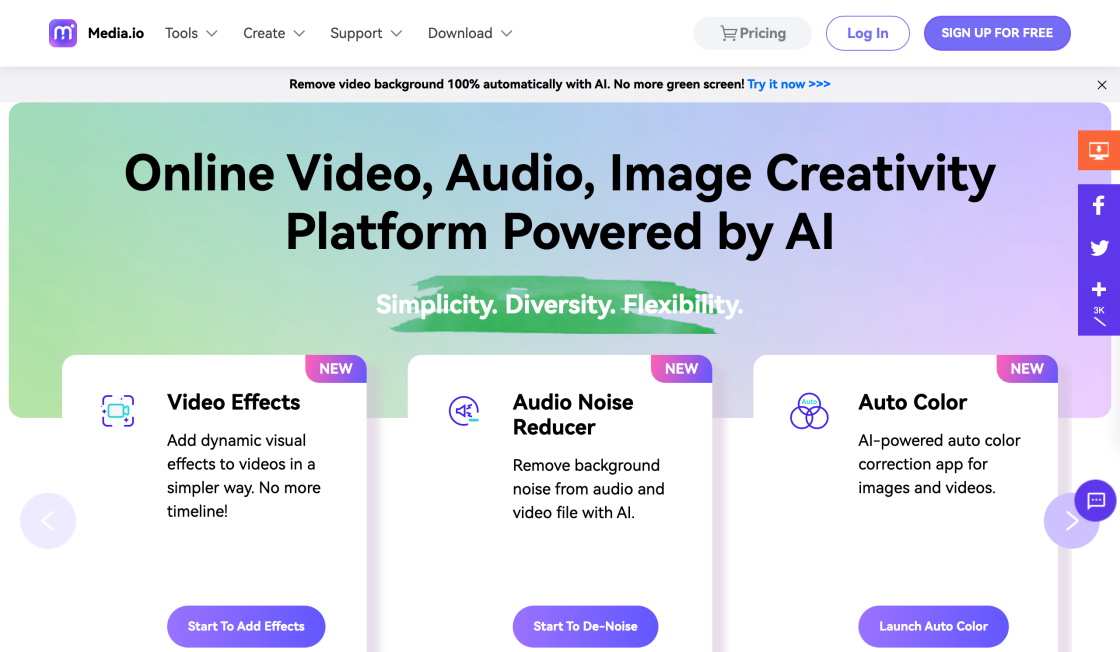

Outerbridge is an open-source low-code/no-code workflow automation application, focusing on integrating on-chain (Web3) and off-chain (Web2) applications. It is free to self-host and easily extensible to build your own custom integrations.
Automation Tooling for Next, Redux and Prisma. Auto generate core scaffolding for Next.js projects. Leverage Printer decorations to automatically inject slices into components with one simple command.
Shortkut AI is a unique browser extension designed to revolutionize productivity by minimizing repetitive work. The extension is powered by an intelligent AI algorithm that suggests useful shortcuts for users to automate their tasks on Chrome. With Shortkut AI, users can create and manage customized AI-powered snippets that help templatize common messages, thereby saving time and effort. This feature also enables users to respond to customer queries much faster. Shortkut AI is a must-have tool for anyone seeking to maximize their productivity while minimizing their workload.
Task Scheduler is a vital utility in Windows that enables users to automate different tasks on their computer. It is an advanced tool that can greatly enhance productivity by automating repetitive tasks such as software updates, backups, system maintenance, and other operations. The Task Scheduler provides an easy-to-use interface that enables users to schedule tasks to run at specific times or when certain conditions are met. With the Task Scheduler, users can streamline their daily tasks and free up valuable time to focus on more important matters.
Amazon AWS is a significant player in the cloud computing industry, providing a comprehensive range of services to organizations of all sizes. It offers flexible solutions for computing power, database storage, content delivery, and various other functionalities. With AWS, businesses can scale their operations and infrastructure quickly and efficiently without having to invest heavily in hardware or software. The platform has become increasingly popular among enterprises and startups alike, thanks to its reliability, security, and ease-of-use. This introduction aims to provide an overview of Amazon AWS and its importance in modern-day business operations.
Autory is an innovative no-code automation platform powered by AI technology. The platform is designed to boost productivity by enabling users to connect various tools to GPT-3, a powerful natural language processing tool. With Autory, users can create complex code structures without writing any code, thus saving time and increasing efficiency. This cutting-edge solution has revolutionized the way businesses automate their processes, making it easier for everyone to take advantage of automation technology.

DALL·E 2 By OpenAI
DALL-E AI image generator can now edit pictures

Canva Text-to-Image
AI-Generated Graphics

CharacterAI
Personality Insights and Predictive Analytics

Copy.ai
Copy.ai: Write better marketing copy and content with AI

FILM
google-research/frame-interpolation – Run with an API on Replicate

Media.io
Media.io - Online Free Video Editor, Converter, Compressor

Uberduck
Uberduck | Text-to-speech, voice automation, synthetic media

Flowrite
Flowrite - Supercharge your daily communication
Amazon Web Services (AWS) is a leading provider of cloud computing services that offers a comprehensive suite of tools and resources for businesses of all sizes. It provides a range of services, including compute, storage, database, analytics, and application services, that help organizations to harness the power of the cloud and improve their operational efficiency. AWS has revolutionized the way businesses operate by providing on-demand access to scalable computing resources that can be easily customized to suit their specific needs. With its pay-as-you-go pricing model, customers can save significant costs and only pay for what they use. AWS is also known for its high level of security, reliability, and scalability, making it an ideal platform for hosting critical applications and data. The platform offers a range of tools and technologies that enable developers to build, deploy, and manage applications quickly and efficiently. This introduction will delve into the various features and benefits of AWS, highlighting how it has transformed the world of cloud computing.
AWS is a cloud computing platform from Amazon that offers a wide range of services, including compute, storage, database, analytics, and application services.
AWS works by providing on-demand access to computing resources over the internet. Users can deploy and manage their own applications and data on AWS infrastructure.
AWS offers a broad range of services, including compute, storage, database, analytics, and application services. Some examples include EC2, S3, RDS, DynamoDB, Redshift, Lambda, and more.
The benefits of using AWS include increased scalability, flexibility, reliability, and security. AWS also offers cost-effective pricing models and a wide range of tools and services to help users manage their infrastructure.
Yes, AWS is suitable for businesses of all sizes and industries. AWS offers solutions for startups, enterprise companies, and everything in between.
AWS takes security very seriously and implements a wide range of measures to protect user data and resources. AWS complies with industry standards and regulations, and offers advanced security features such as encryption, network isolation, and access controls.
AWS pricing varies depending on the specific services and usage. AWS offers pay-as-you-go pricing models, which allows users to only pay for the resources they use.
AWS offers a range of support options, including documentation, forums, and technical support. AWS also offers premium support plans for customers who require additional assistance.
Yes, AWS offers integrations with other cloud providers and services. Users can build hybrid cloud environments that leverage multiple cloud providers.
To get started with AWS, users can sign up for a free account and begin exploring the range of services and tools available. AWS also offers extensive documentation and tutorials to help users get started.
| Competitor | Description | Key Services | Strengths | Weaknesses |
|---|---|---|---|---|
| Microsoft Azure | Cloud computing platform from Microsoft | Compute, storage, database, analytics, and application services | Strong integration with Microsoft products, hybrid cloud capabilities | Limited availability in certain regions |
| Google Cloud Platform | Cloud computing platform from Google | Compute, storage, database, analytics, and application services | Advanced machine learning capabilities, strong data analytics tools | Less mature than AWS and Azure |
| IBM Cloud | Cloud computing platform from IBM | Compute, storage, database, analytics, and application services | Strong focus on enterprise customers, extensive security and compliance offerings | Limited availability of some services |
| Oracle Cloud Infrastructure | Cloud computing platform from Oracle | Compute, storage, database, analytics, and application services | Strong support for Oracle applications, high-performance computing capabilities | Limited availability in certain regions |
| Alibaba Cloud | Cloud computing platform from Alibaba Group | Compute, storage, database, analytics, and application services | Strong presence in Asia, competitive pricing | Limited availability in certain regions, less mature than AWS and Azure |
Amazon Web Services (AWS) is a comprehensive cloud computing platform from Amazon that offers a wide range of services, including compute, storage, database, analytics, and application services. AWS provides businesses with on-demand access to scalable computing resources, allowing them to quickly and easily deploy and manage their applications and services.
One of the key benefits of AWS is its flexibility. AWS can be used to host a variety of applications, ranging from simple websites to complex enterprise applications. Businesses can choose from a range of computing resources, including virtual machines, containers, and serverless computing options. This allows businesses to select the most appropriate computing resources for their specific needs, ensuring that they only pay for what they use.
Another benefit of AWS is its scalability. AWS allows businesses to easily scale their computing resources up or down as needed, without having to worry about hardware limitations. This makes it easy for businesses to respond quickly to changes in demand, ensuring that they can always provide their customers with the best possible experience.
AWS also provides a range of storage options, including object storage, block storage, and file storage. Businesses can choose the storage option that best fits their needs, depending on the type of data they are storing and how they need to access it.
AWS also provides a range of database services, including relational databases, NoSQL databases, and in-memory databases. These services make it easy for businesses to store and manage their data, while also providing advanced analytics capabilities to help businesses gain insights from their data.
Finally, AWS provides a range of application services, including messaging, queuing, and notification services. These services allow businesses to build and run highly scalable and reliable applications, ensuring that they can deliver the best possible experience to their customers.
In conclusion, AWS is a comprehensive cloud computing platform that provides businesses with a wide range of services, including compute, storage, database, analytics, and application services. With its flexibility, scalability, and range of services, AWS is an ideal choice for businesses looking to take advantage of the benefits of cloud computing.
TOP